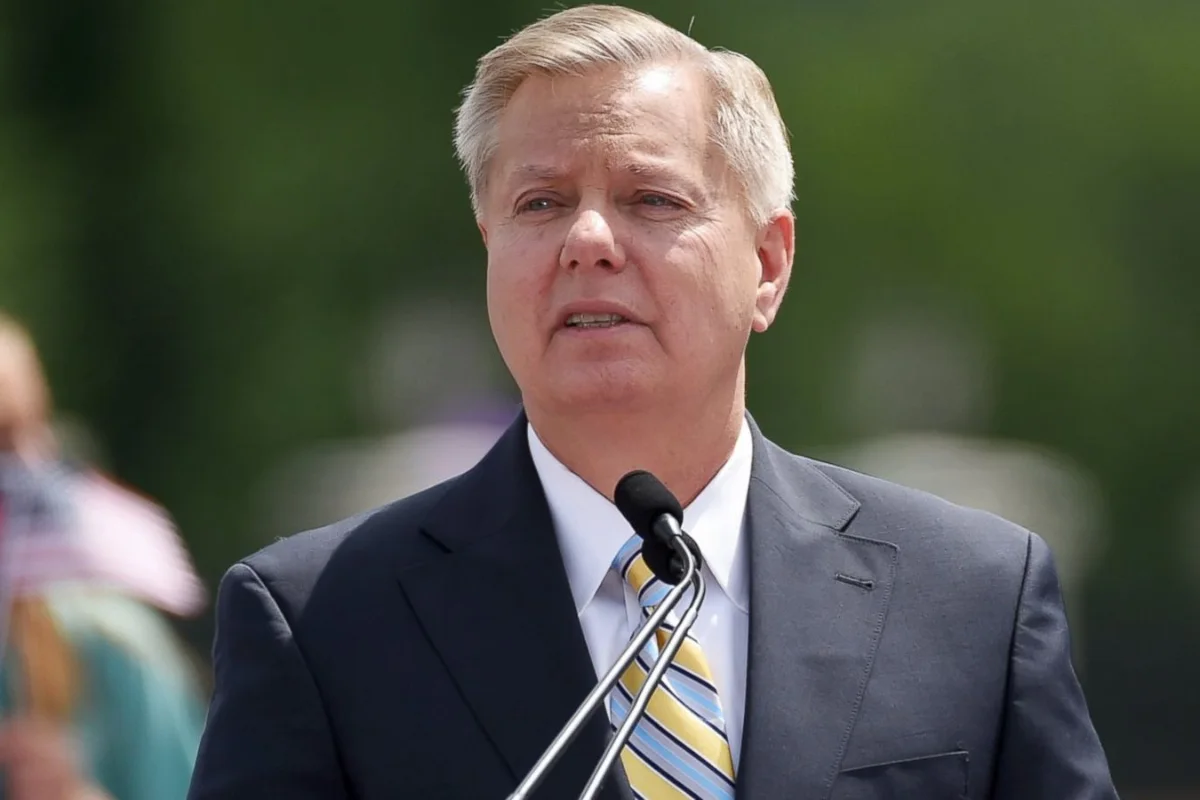Lindsey Graham is a long-serving U.S. Senator from South Carolina, who is also popular for his fiery speeches, sharp wit, and unpredictable political associations. Additionally, Graham has carved out a unique path through Washington’s polarized landscape. Over the decades, he has evolved from a traditional Republican voice to a significant power player in shaping America’s foreign policy, national defense, and judicial appointments.
Early Life and Education
Lindsey Olin Graham was born on July 9, 1955, in Central, South Carolina, to Florence James and Millie Graham, who ran a small pool hall, restaurant, and liquor store called Sanitary Café. Graham grew up in modest circumstances, learning the values of hard work, resilience, and community at an early age.
Tragedy struck early in his life. When he was still in college, both of his parents passed away, his mother from Hodgkin’s disease and his father shortly thereafter from a heart attack. Suddenly orphaned, Graham took legal guardianship of his younger sister, Darline, and raised her while finishing his education. This experience profoundly shaped his sense of responsibility and empathy, later influencing his approach to politics and public service.
He attended the University of South Carolina, where he earned a B.A. in Psychology in 1977 and later a Juris Doctor degree in 1981. His academic years were marked by ambition and leadership, but it was his later military and legal experience that truly prepared him for a career in politics.
Military Career and Service of Lindsey Graham
Before entering politics, Lindsey Graham established an impressive career in the military and legal systems. After law school, he joined the U.S. Air Force Judge Advocate General’s Corps (JAG), where he served as a defense attorney and prosecutor.
During his tenure, Graham was stationed in Europe and the United States, gaining firsthand experience with military law and international operations. He remained a member of the Air Force Reserve for more than 30 years, retiring in 2015 with the rank of Colonel.
Graham’s lengthy military background became a cornerstone of his political identity. It shaped his strong stance on national defense, veterans’ affairs, and U.S. foreign policy. His understanding of military life helped him connect with servicemembers, reinforcing his credibility on defense committees throughout his congressional career.
Entry into Politics: From South Carolina to Washington
Graham began his political journey in the early 1990s. After working as a private attorney and assistant county attorney in Oconee County, South Carolina, he ran for public office.
He was elected to the South Carolina House of Representatives in 1992, and he quickly gained attention for his pragmatic views and bipartisan approach to governance. The blend of Southern conservatism and moderate sensibility appealed to many voters seeking a reasonable voice in government.
Just two years later, in 1994, Graham got appointed to the U.S.A. House of Representatives from South Carolina’s 3rd congressional district, riding the Republican wave led by Newt Gingrich’s “Contract with America.” During his four terms in the House (1995–2003), he served on several key committees and became known for his focus on national security, judicial reform, and ethical governance.
Rise to the U.S. Senate
In 2002, when long-time Senator Strom Thurmond retired at the age of 100, Lindsey Graham ran for the open Senate seat. He won the election handily, marking the start of a long and influential Senate career.
As a Senator, Graham quickly made his mark as a strong supporter of the U.S. military, a hawkish voice on foreign policy, and a key figure in judicial nominations. He developed a reputation for working across the aisle — often partnering with Democrats, such as John McCain and Joe Lieberman, on issues related to defense, immigration, and ethics.
Graham’s political philosophy was rooted in traditional conservatism: a belief in strong national defense, limited government, and individual responsibility. However, he often defied strict party lines, earning both admiration and criticism for his willingness to challenge Republican leadership when he felt it necessary.
Significant Achievements and Legislative Highlights
Advocate for National Defense
Graham’s military background influenced his policy positions. As a long-time member, Graham pushed for robust defense budgets, modernization of the U.S. military, and a proactive stance against terrorism.
He supported the Afghanistan and Iraq wars, arguing that U.S. intervention was necessary to combat global threats. Although these positions drew controversy, they cemented his image as a staunch defender of U.S. security interests.
Leadership in Judicial Appointments
One of Graham’s areas of influence has been in the confirmation of federal judges, and he served on the Senate Judiciary Committee. He played a central role in confirming multiple Supreme Court justices.
He voted to confirm Sonia Sotomayor and Elena Kagan (both nominated by President Obama) — showcasing his bipartisan streak — but later became a strong supporter of President Donald Trump’s judicial nominees, including Brett Kavanaugh and Amy Coney Barrett.
His fiery defense of Kavanaugh during the 2018 confirmation hearings was one of his most memorable moments in the Senate. This marked a turning point in his political alignment with the Republican base.
Immigration and Bipartisanship
Despite his conservative credentials, Graham has at times supported comprehensive immigration reform. He was part of the “Gang of Eight” senators who, in 2013, introduced a major immigration reform bill combining border security with pathways to citizenship. Though the bill ultimately failed, it showcased his commitment to practical solutions over strict partisanship.
Controversies and Criticisms
Like many long-serving politicians, Graham’s career has not been without controversy. Critics have accused him of inconsistency due to his evolving stances, particularly regarding Donald Trump and specific judicial issues. Others view his political adaptability as a reflection of his ability to survive in a changing Republican Party.
He has also faced scrutiny for his strong support of U.S. military intervention abroad and for his opposition to some Democratic-led investigations and policies. Nonetheless, his supporters praise him for courage, honesty, and his willingness to take unpopular but principled stands.
Relationship with Donald Trump
Perhaps one of the most complex chapters of Lindsey Graham’s career is his relationship with former President Donald Trump. Initially, Graham was one of Trump’s harshest critics during the 2016 Republican primaries, calling him “unfit for office.” However, after Trump’s victory, Graham shifted to become one of his strongest allies in the Senate.
He supported Trump’s judicial nominations, defended him during the impeachment trials, and worked closely with the administration on foreign policy and national defense issues. His transformation raised eyebrows but reflected his pragmatic approach to maintaining influence and advancing conservative goals during the Trump presidency.
Despite occasional differences, Graham emerged as one of the most powerful and visible figures in the Senate during those years.
Controversies and Criticisms
Like many long-serving politicians, Graham’s career has not been without controversy. Critics have accused him of inconsistency due to his evolving stances, particularly regarding Donald Trump and specific judicial issues. Others view his political adaptability as a reflection of his ability to survive in a changing Republican Party.
He has also faced scrutiny for his strong support of U.S. military intervention abroad and for his opposition to some Democratic-led investigations and policies. Nonetheless, his supporters praise him for courage, honesty, and his willingness to take unpopular but principled stands.
Conclusion
Lindsey Graham’s life story is one of grit, adaptation, and unwavering commitment to public service. From a small-town boy in South Carolina who faced personal tragedy to a decorated Air Force colonel and a senior U.S. Senator, his journey reflects the American spirit of determination.
Whether praised for his courage or criticized for his shifting alliances, Lindsey Graham remains a defining voice in American politics — one who continues to shape national debates on defense, justice, and democracy itself.





